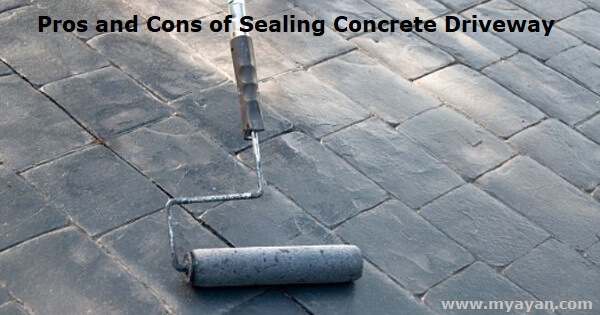You may be thinking about beautifying your concrete driveway by sealing it. Concrete sealers come in various types and are used for the same purposes; they're all acrylic resin-based, epoxy, or penetrating sealers. They might have various characteristics, but they all serve the same purpose. Here are some pros and cons of concrete driveway sealing.
You might be thinking of sprucing up your concrete driveway by having it sealed. Concrete sealers vary depending on their effectiveness, longevity, and, of course, price—there are acrylic resin-based, epoxy, and penetrating sealers. They may be a bit different from one another, but they all are used for the same reasons. Since each material has its own properties, here are some pros and cons of sealing the concrete driveway.
People opt to sealing their driveways with concrete for several reasons. The main reason is that it protects your concrete from weathering, staining, and other damage. Some other pros of the concrete sealing driveway are mentioned below:
Concrete sealing repairs cracks and other surface damage and gives your driveway a high-gloss "wet look" that makes it appear brand new.
Sealing your concrete driveway creates a barrier between the concrete and outside elements such as water, salt, dirt, and oil. This protection can extend the life of your concrete driveway by preventing cracks, spalling, and other types of damage.
While you can hire a professional to seal your concrete driveway, it is a relatively simple process that you can do yourself. Sealing your own driveway can save you money and is not overly time-consuming.
A sealer can darken the color of your driveway and make the colors pop. Colored concrete is one of the most popular driveway solutions today. A sealer coating helps make stains, dyes, or pigments more vivid. It also helps to keep the surface looking newer and brighter by making it a bit smoother, depending on the type of sealer used.
Sealing your concrete driveway makes it look better, but it can also increase the value of your home. A well-maintained driveway shows that you take pride in your home, which can be appealing to potential buyers.
It's full of benefits, but there are certain cons of sealing a concrete driveway that you should also be aware of:
One of the main cons of sealing concrete driveway is that it can make the surface more slippery. This is especially true if your sealer contains silicone or other slick ingredients. If you live in an area with cold winters, this can be a severe safety hazard.
Sealed driveways need to be resealed every one to three years, depending on the type of sealer used and the amount of traffic your driveway gets. Not resealing your driveway on time can result in cracks, pitting, and other damage.
The biggest disadvantage of sealing a concrete driveway is that you must reseal it every two to three years. This can be a time-consuming and costly process, so be sure to factor it into your budget.
Once colored, it can’t be changed; if you decide to seal your concrete driveway, you will be stuck with the current color. While you can always add stains or dyes to change the color, it will be more complicated than if you had not sealed it. This limitation is ultimately one of the cons of sealing concrete driveway worth mentioning.
It can be a time-consuming and challenging process if you ever decide to remove the sealer from your concrete driveway. You will likely need to use strong chemicals or hire a professional to do the job.
While sealing your concrete driveway has many benefits, it is not necessary. If you are happy with the way your driveway looks and it is in good condition, there is no need to go through the hassle and expense of sealing it.
Conclusion on the Pros and Cons of Sealing Concrete Driveway
There are pros and cons to consider when deciding if concrete sealing is the right choice. On the one hand, sealants can protect your driveway from weathering and staining, making it last longer. On the other hand, sealants can be expensive, and if they’re not applied correctly, they can damage your driveway. Ultimately, whether or not concrete sealing is worth it depends on your specific needs and situation. We hope this article has helped you decide whether or not to seal your driveway with concrete.

Even for those who live in regions where it never drops below freezing, sealing and coating your concrete driveway may assist prevent discoloration, staining, and damage from oil, salt, and other domestic chemicals.
If you're ready to get started, click here to find the best concrete sealer for your needs. Whether it's a patio or a pathway that needs sealing, this is an excellent time to do so. A sealer will preserve the appearance and longevity of the concrete while bringing out its rich color. Water will be repelled from absorbing into the concrete surface by beading it on top. This helps concrete last longer, especially in the winter season.
If you keep your concrete looking new, it will last a long time. If you never seal it at all, it will suffice, but if you apply a high-quality sealer every few years, it will extend its life and preserve its appearance. This is especially true if your driveway or patio is stained or etched.
The concrete should be sealed. You may apply a concrete sealer once the concrete has been allowed to dry for at least 24 hours. A sealer protects the surface against stains and other irritants such as ice salts in the future. Some sealers leave a glossy sheen on the surface, while others have a matte finish.